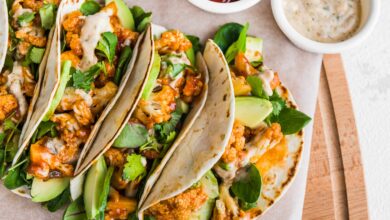A
A
A
Unless you’ve lived under a rock this year, you have definitely heard about plant-based alternatives. Fast food restaurants, upscale restaurants and coffee shops offer new plant-based options. Radio and news stations won’t stop jabbering about them. So what gives? It can be confusing to understand what plant-based meat is when it sounds like such an oxymoron. Understanding the latest hype around plant-based products may just be your key to leading the conversation at the holiday table this season.
What Plant-Based Alternatives Are
Read More »
The origins of for example, traditional beef, conjure up images of slaughterhouses with questionable conditions for cows. Plant-based beef origins are less clear; where is this stuff coming from? Instead of getting protein directly from the cow, plant-based protein extracts from a plant. Popular plant-based proteins include pea, mung bean, potato and rice. Delicious seasonings and plant-friendly oils are often used with methylcellulose to bind it all together. Beet juice extract and plant-based heme are sometimes used to simulate a meaty taste. The beet juice replicates “bleeding” while cooking. Plant-based meatballs, sausages and chicken nuggets all undergo a similar process. The result is a perfectly delicious and plant-based alternative. The possibilities are endless!
Why People Want Plant-Based Lifestyles
If you aren’t vegan or vegetarian, the idea of an animal-free patty may not excite you. But it could. Western culture glories hot dogs, hamburgers, steaks and chicken sandwiches. Yet, more and more consumers are discovering the downsides of excessive meat consumption. Animal activists have historically denounced the morality of fattening up cattle only to slaughter them inhumanely. On top of the cruelty, unhygienic slaughterhouse conditions have led to widespread bacteria contamination like E.coli, leading to product recalls. Our climate also pays for our insatiable desire to consume these animals, as many climate scientists warn we are now under a climate emergency. Animal consumption cannot take the entire blame for our climate catastrophe, but it is certainly a large element. The status quo of our consumption cannot go on in order to save our earth.
On the flip side, consuming plant-based alternatives is just good for your health. Nutritionists warn that red and processed meat consumption increase the risk for heart disease. Heart disease is the leading cause of death in the United States. Plant-based alternatives offer a significant amount of fiber as well, while animal protein does not. Fiber deficiencies among consumers are common, making the plant-based alternative a better choice. Of course, a tasty plant-based patty should be considered a treat. A healthy vegan, vegetarian or flexitarian diet consists of vegetables and fruits. But a delicious plant-based meal can start a healthier and more sustainable diet!
The Future of Plant-Based
It is hard to say what the future of our diets will be in five, ten or twenty years. However, it is undeniable that there has been a plant-based shift in our culture. Mainstream restaurants debuted their version of a plant-based alternative in 2019. Supermarkets started carrying animal-free alternatives in their frozen aisles. Multiple companies are competing to create the “meatiest” product by experimenting with new ingredients. Despite all the effort from corporations to get the public to love these new creations, the future of them comes down to the consumers. People interested in trying a plant-based patty or nugget will have to be open to trying them and incorporating them into their diets. While vegans and vegetarians are rejoicing with newfound options, the average carnivore is the key to where these products will be in the mainstream future.
In conclusion, the plant-based lifestyle is ubiquitously known to the average consumer in 2019. A hyper-realistic taste paired with health and environmental benefits pushes people to try a plant-based alternative. The future of these plant-based alternatives is unknown, despite the hype. If you’re interested, why not ask your family to try a plant-based roast at your holiday table this year? You just may convert a new fleet of believers into trying a plant-based food.






